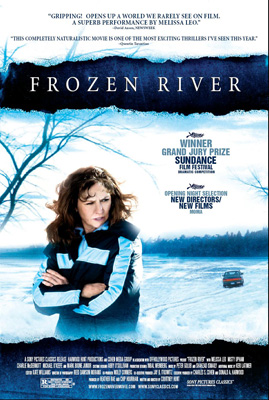

Director: Courtney Hunt, 2008.
Frozen River is the low-budget debut for writer-director Hunt and garnered the Grand Jury prize at the Sundance Festival. A slow drama, it has tension and several moral dilemmas that keep the audience's attention. While focusing attention on the issue of human trafficking, it shoots a spotlight on the survival of single mothers living below the poverty lines in lower class America.
The movie is set in upstate New York, just below Quebec. Ray Eddy (Melissa Leo) is waiting to buy a new double-wide manufactured home but her husband has split with the cash to gamble it away. Ray is left with her two kids, and it is a week before Christmas. Without the money she will lose her deposit on the new home. Having no other money, this family has to survive on popcorn and Tang for meals until the next paycheck comes in. This is barely baseline living.
 When she sees Lila (Misty Upham) driving her husband's car away from a bingo hall, Ray follows her to the Mohawk reservation and the trailer that Lila lives in. This ugly introduction brings Ray into the world of immigrant smuggling, Lila's way of earning fast money.
When she sees Lila (Misty Upham) driving her husband's car away from a bingo hall, Ray follows her to the Mohawk reservation and the trailer that Lila lives in. This ugly introduction brings Ray into the world of immigrant smuggling, Lila's way of earning fast money.At first Ray is a woman of principles, but circumstances conspire against her. A tough woman, she is trying to protect her kids, requiring them to be in school even though TJ (Charlie McDermott), the 15 year-old, could be earning money to put food on the table. Blamed by TJ for her husband's problems, she is bitter but not ready to give up on him or life. But with debts mounting, food missing, and the double-wide about to disappear, the lure of some quick untaxable cash causes her to compromise her principles.
As she and Lila drive over the frozen river separating Canada from the Mohawk reservation and America, their "partnership" is tense and untrusting. Ray's value to Lila is her car which has a large trunk with a manual release allowing several people to hide there. Lila's value to Ray are her connections.
As she descends into this other world, Ray sees people who are worse off than herself. There are Asians and Pakistanis who are paying heavily for the chance to be smuggled into America and their dream of a new life. But even that dream is sullied by the fact that most will have to serve in sweatshops as little more than slaves to payback the smugglers the $50,000 or more they are being charged. What price freedom?
What makes this film interesting is the interplay between Ray and Lila. Melissa Leo has a first-rate performance as a mother at the end of her rope whose eyes are opened to others' suffering. And as she learns to see beyond stereotype, she comes to see the cost and consequences of crime.
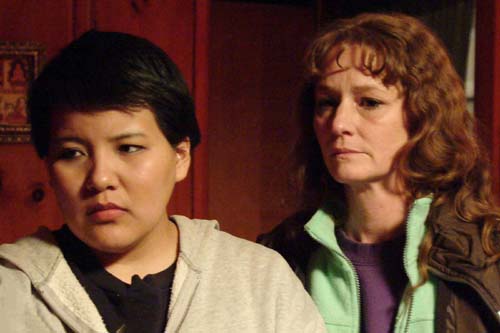 Lila and Ray have more in common than Ray first thinks. Both have lost a husband. Lila has lost hers literally, having drowned in the river they are now driving over. Whereas Ray has lost hers to a gambling addiction; he may be drowned in debt and never come back. Lila has lost a child, an only child, having had her boy taken from her by her mother-in-law. Apparently the Tribal Police on the reservation are not concerned about this kind of thing. Ray is losing her children emotionally, especially TJ as he begins to move into a life of petty crime for petty cash; like mother like son.
Lila and Ray have more in common than Ray first thinks. Both have lost a husband. Lila has lost hers literally, having drowned in the river they are now driving over. Whereas Ray has lost hers to a gambling addiction; he may be drowned in debt and never come back. Lila has lost a child, an only child, having had her boy taken from her by her mother-in-law. Apparently the Tribal Police on the reservation are not concerned about this kind of thing. Ray is losing her children emotionally, especially TJ as he begins to move into a life of petty crime for petty cash; like mother like son.Frozen River, based around the issue of illegal immigration, shares a common theme with The Visitor, another low-budget movie. But the immigrants in The Visitor were not smuggled in, nor were they destined for slavery. Indeed, The Visitor was a lighter film but it turned political, with a clear agenda, in its second act. Frozen River, in contrast, is more holistic, keeping its message less devoid of overt sermonizing. In both films the main actor gives an Oscar-nominated performance.
When State Trooper Finnerty (Michael O'Keefe) comes to the store where Ray works, after she has made her first smuggling trip, her guilt is evident in her demeanor. But he is not here to arrest her. He is here to buy Christmas junk. Her lack of eye contact, her fearful shuffling around until he goes, should be enough to convince her that a run-in with the law is not what she wants. But Lila has told her that the State Troopers have no jurisdiction on the reservation and so the consequences are minimal -- a fine or a nominal jail-term.
 Later Trooper Finnerty comes to her home to ask her some questions about Lila and to subtly warn her. Things are coming closer to home. But Ray's need for gifts and the double-wide are even more desperate, and she continues in this path of crime. Ray needs one more run just like an addict's one more fix.
Later Trooper Finnerty comes to her home to ask her some questions about Lila and to subtly warn her. Things are coming closer to home. But Ray's need for gifts and the double-wide are even more desperate, and she continues in this path of crime. Ray needs one more run just like an addict's one more fix.When the finale approaches, things go badly wrong. The final pick-up is mishandled. They run into serious problems, and they are forced to foot it over the river. When they arrive at Lila's Mohawk reservation they face a legal dilemma, and Trooper Finnerty, and someone has to pay the price.
Although Frozen River has no happy ending, there is hope and there is redemption. Ray has come to realize that she is blessed with two healthy children, even if her husband has left her for good. And even if the dream of a brand new double-wide dissipates, she still has a home. Lila has come to realize she is empowered to move into her little boy's life. And the debacle of the smuggling has brought two mothers together in a relational bond that perhaps nothing apart from suffering could do. Suffering has a way of cutting through the dross to show the silver and gold lying below.
Frozen River is no typical movie. It shows clearly the consequences of poor choices. Sin catches up with the sinner. In life this often happens. We may want to solve our problems with a quick fix, but there are usually no quick fixes. What seems too good to be true is often so. There is usually no substitute for living correctly, even if it means we don't get what we want. God loves us and wants us to develop our characters more than our comforts. We have ample warning in the Bible against sinning. We should heed such warning.
Copyright ©2009, Martin Baggs



 As the movie begins, Fresnadillo takes us back to the days of the original outbreak. Don (Robert Carlyle) and his wife Alice (Catherine McCormack) are living in a farmhouse with several other survivors. When they are attacked by the infected, Don and Alice are trapped in a bedroom. But one of the infected zombies breaks in; Don leaves Alice and flees through the window. Looking back he sees her pleas for help before she disappears.
As the movie begins, Fresnadillo takes us back to the days of the original outbreak. Don (Robert Carlyle) and his wife Alice (Catherine McCormack) are living in a farmhouse with several other survivors. When they are attacked by the infected, Don and Alice are trapped in a bedroom. But one of the infected zombies breaks in; Don leaves Alice and flees through the window. Looking back he sees her pleas for help before she disappears. Don is now caretaker of one of the towers and has AAA status -- all area access. His two children, 17 year-old Tammy (Imogen Poots) and 12 year-old Andy (Mackintosh Muggleton), survived the plague since they were in Spain at the outbreak, and they are reunited with their dad in this repopulation. Indeed, Andy is declared the youngest person in Britain, since they are the first children allowed back into the country.
Don is now caretaker of one of the towers and has AAA status -- all area access. His two children, 17 year-old Tammy (Imogen Poots) and 12 year-old Andy (Mackintosh Muggleton), survived the plague since they were in Spain at the outbreak, and they are reunited with their dad in this repopulation. Indeed, Andy is declared the youngest person in Britain, since they are the first children allowed back into the country.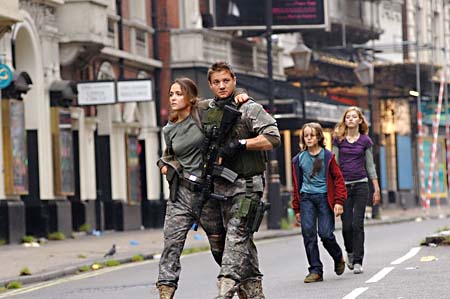 When panic breaks out and the infected run rampant, the US goes into code red: "Step 1: Kill the infected. Step 2: Containment. If containment fails, then Step 3: Extermination." Scarlet stays with Andy and Tammy, and along with infantry sniper Doyle (Jeremy Renner) and some no-name survivors, they need to flee the area and rendezvous with an escape helicopter across London. The scene is set for the chase and slow demise of this last platoon.
When panic breaks out and the infected run rampant, the US goes into code red: "Step 1: Kill the infected. Step 2: Containment. If containment fails, then Step 3: Extermination." Scarlet stays with Andy and Tammy, and along with infantry sniper Doyle (Jeremy Renner) and some no-name survivors, they need to flee the area and rendezvous with an escape helicopter across London. The scene is set for the chase and slow demise of this last platoon.

 When he stumbles into a church he discovers a pile of dead bodies and a few living people. But these are barely people; they are irrational blood-crazed creatures seeking the living.
When he stumbles into a church he discovers a pile of dead bodies and a few living people. But these are barely people; they are irrational blood-crazed creatures seeking the living. The second act brings Selena and Jim into contact with Frank (Brendan Gleeson) and his daughter Hannah (Megan Burns). They are literally imprisoned in their apartment waiting for other survivors to find them. They have heard of a cure, but it is 200 miles north, a journey they would not make on their own. Taking his London taxi, they travel to the army compound that apparently has the cure. En route, Jim has to kill one of the infected. This is his "rite of passage" into this new kind of living.
The second act brings Selena and Jim into contact with Frank (Brendan Gleeson) and his daughter Hannah (Megan Burns). They are literally imprisoned in their apartment waiting for other survivors to find them. They have heard of a cure, but it is 200 miles north, a journey they would not make on their own. Taking his London taxi, they travel to the army compound that apparently has the cure. En route, Jim has to kill one of the infected. This is his "rite of passage" into this new kind of living. Jim and West are an interesting study in contrasts. Jim is at first naive ("What do you mean there's no government? There's always a government, they're in a bunker or a plane somewhere"), looking for someone to pass the buck to. West is cynical, it's just people killing people as it always is and always will be. Jim's transition from denial to acceptance occurs when he himself kills. Killing is nothing new to West. Jim, the hero, is chivalric, especially in the castle, where chivalry usually has its home. He wants to protect his two friends. West is pragmatic in his command. he wants to protect his men.
Jim and West are an interesting study in contrasts. Jim is at first naive ("What do you mean there's no government? There's always a government, they're in a bunker or a plane somewhere"), looking for someone to pass the buck to. West is cynical, it's just people killing people as it always is and always will be. Jim's transition from denial to acceptance occurs when he himself kills. Killing is nothing new to West. Jim, the hero, is chivalric, especially in the castle, where chivalry usually has its home. He wants to protect his two friends. West is pragmatic in his command. he wants to protect his men.

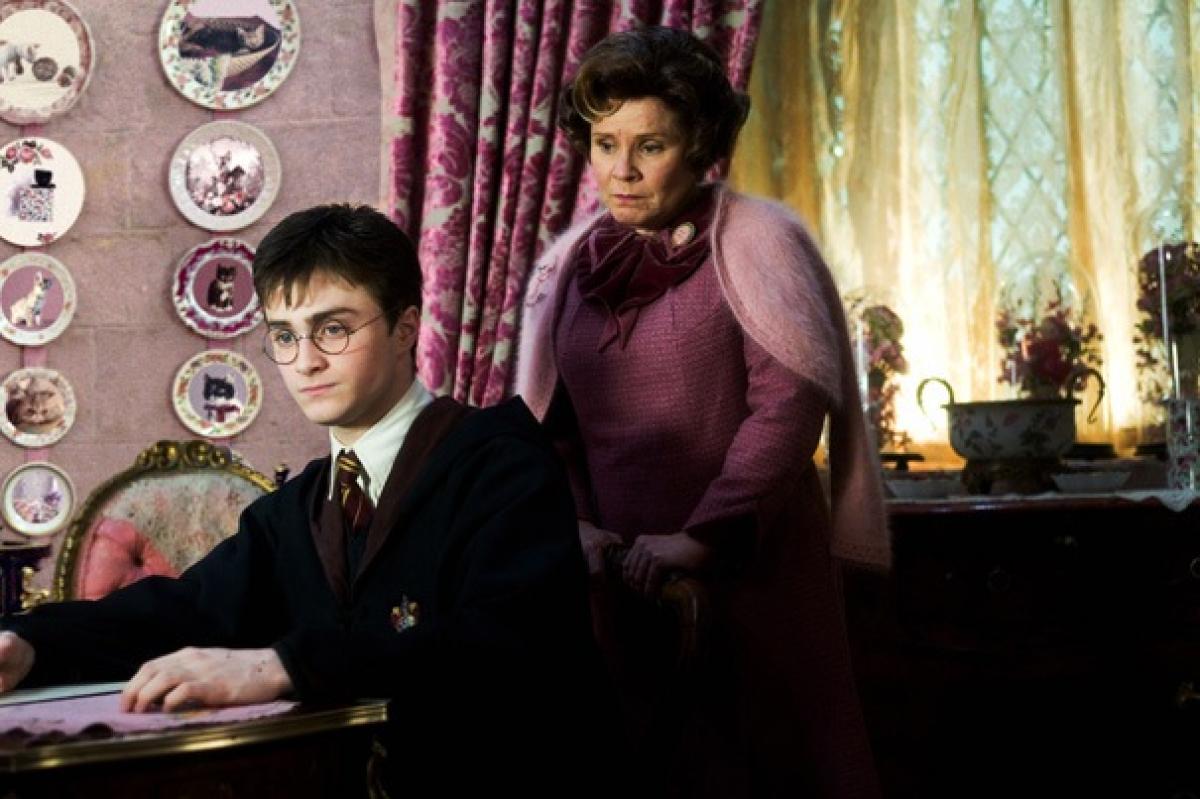 When Harry and his friends arrive at Hogwarts, they find a new Defence Against the Dark Arts teacher, Dolores Umbridge (Imelda Staunton). Appointed by Fudge, she is a plant to ensure that Dumbledore and Potter stay in line. Avoiding any actual experience of spells in class, she focuses solely on theoretical book-knowledge. She also acts as a Spanish Inquisitor, with powers to do almost anything. Hogwarts, with Umbridge, descends into a totalitarian institution. With Draco Malfoy appointed one of her deputies it can rightly be called draconian.
When Harry and his friends arrive at Hogwarts, they find a new Defence Against the Dark Arts teacher, Dolores Umbridge (Imelda Staunton). Appointed by Fudge, she is a plant to ensure that Dumbledore and Potter stay in line. Avoiding any actual experience of spells in class, she focuses solely on theoretical book-knowledge. She also acts as a Spanish Inquisitor, with powers to do almost anything. Hogwarts, with Umbridge, descends into a totalitarian institution. With Draco Malfoy appointed one of her deputies it can rightly be called draconian. With Umbridge taking control of the school so the students don't learn the truth, Harry is isolated. Many of the students believe what they have been told or read, that Harry is a liar. Only Ron (Rupert Grint) and Hermione (Emma Watson) remain loyal. But new student looney Luna Lovegood (Evanna Lynch) tells him she and her father believe him too. When Harry says, "Seems you're about the only ones that do," she replies, "I suppose that's how he wants you to feel. . . If I were You-Know-Who, I'd want you to feel cut off from everyone else. Because if it's just you alone, you're not much of a threat." Isolation leads to despair and despair is crippling.
With Umbridge taking control of the school so the students don't learn the truth, Harry is isolated. Many of the students believe what they have been told or read, that Harry is a liar. Only Ron (Rupert Grint) and Hermione (Emma Watson) remain loyal. But new student looney Luna Lovegood (Evanna Lynch) tells him she and her father believe him too. When Harry says, "Seems you're about the only ones that do," she replies, "I suppose that's how he wants you to feel. . . If I were You-Know-Who, I'd want you to feel cut off from everyone else. Because if it's just you alone, you're not much of a threat." Isolation leads to despair and despair is crippling. Throughout this fifth year, Harry experiences strange dreams, dreams where he sees things from a snake's perspective. Somehow, Voldemort is getting into his head while he is asleep. Fearful of this growing connection with Voldemort, Harry thinks he is becoming more like him. In a moment of honest vulnerability, he confesses this to his godfather, Sirius Black (Gary Oldman). Black comforts him, "You're not a bad person. You're a very good person. . . . We've all got both light and dark inside us. What matters is the part we choose to act on. That's who we really are." Good comfort, bad theology.
Throughout this fifth year, Harry experiences strange dreams, dreams where he sees things from a snake's perspective. Somehow, Voldemort is getting into his head while he is asleep. Fearful of this growing connection with Voldemort, Harry thinks he is becoming more like him. In a moment of honest vulnerability, he confesses this to his godfather, Sirius Black (Gary Oldman). Black comforts him, "You're not a bad person. You're a very good person. . . . We've all got both light and dark inside us. What matters is the part we choose to act on. That's who we really are." Good comfort, bad theology. As the exciting climax approaches, Harry is drawn mysteriously back to the Ministry. He thinks it is best to go it alone, but Ron, Hermione and some others from his "army" persuade him that teamwork will prevail: "We're in this together!" This is good advice for Harry and for us. We cannot live apart from others. In the Christian community, when we find ourselves pulling away, the words from Hebrews echoes Hermione's advice: "Let us not give up meeting together" (Heb. 10:25). We cannot have victory alone.
As the exciting climax approaches, Harry is drawn mysteriously back to the Ministry. He thinks it is best to go it alone, but Ron, Hermione and some others from his "army" persuade him that teamwork will prevail: "We're in this together!" This is good advice for Harry and for us. We cannot live apart from others. In the Christian community, when we find ourselves pulling away, the words from Hebrews echoes Hermione's advice: "Let us not give up meeting together" (Heb. 10:25). We cannot have victory alone.

 After this unexpected meeting, Walter allows them to stay in his apartment while they search for their own and a friendship begins. Walter is a very private person and at first he is content to live with brief interactions. But when he comes home to find Tarek in his tighty whiteys playing the African drum Walter's defenses come down. He is captivated by this instrument, and Tarek teaches him to play it. In doing so, he is really teaching him to reconnect with life. As he begins to practice playing this drum, Walter finds rhythm and purpose. Playing together in the apartment there is a sense of grace, of relating even without words.
After this unexpected meeting, Walter allows them to stay in his apartment while they search for their own and a friendship begins. Walter is a very private person and at first he is content to live with brief interactions. But when he comes home to find Tarek in his tighty whiteys playing the African drum Walter's defenses come down. He is captivated by this instrument, and Tarek teaches him to play it. In doing so, he is really teaching him to reconnect with life. As he begins to practice playing this drum, Walter finds rhythm and purpose. Playing together in the apartment there is a sense of grace, of relating even without words. In a beautiful scene, Tarek meets Walter and they go to Central Park where other drummers gather to make music together. Tarek sits and plays, but Walter is reluctant. Perhaps fearful of inadequate talent, shy and reserved Walter stands on the periphery with the crowd of observers. But his feet are tapping and his hands want to be playing. With some urging from Tarek Walter steps in and begins to play. He is the only white man in this circle of musicians, but he is no longer worried, no longer self-conscious. He is lost in the joy and simple pleasure of making music. Skin color and gender are irrelevant. The beat and the music are central.
In a beautiful scene, Tarek meets Walter and they go to Central Park where other drummers gather to make music together. Tarek sits and plays, but Walter is reluctant. Perhaps fearful of inadequate talent, shy and reserved Walter stands on the periphery with the crowd of observers. But his feet are tapping and his hands want to be playing. With some urging from Tarek Walter steps in and begins to play. He is the only white man in this circle of musicians, but he is no longer worried, no longer self-conscious. He is lost in the joy and simple pleasure of making music. Skin color and gender are irrelevant. The beat and the music are central. the bureaucratic middle of the detention centers. Some of the scenes and their dialog do sound a little preachy. Yet, the bigger picture is that of the effect of Tarek's incarceration on Walter. And when Walter finally cries out, "It's not fair!" he is acting like a little kid -- full of emotion and passion. This is the new Walter!
the bureaucratic middle of the detention centers. Some of the scenes and their dialog do sound a little preachy. Yet, the bigger picture is that of the effect of Tarek's incarceration on Walter. And when Walter finally cries out, "It's not fair!" he is acting like a little kid -- full of emotion and passion. This is the new Walter!
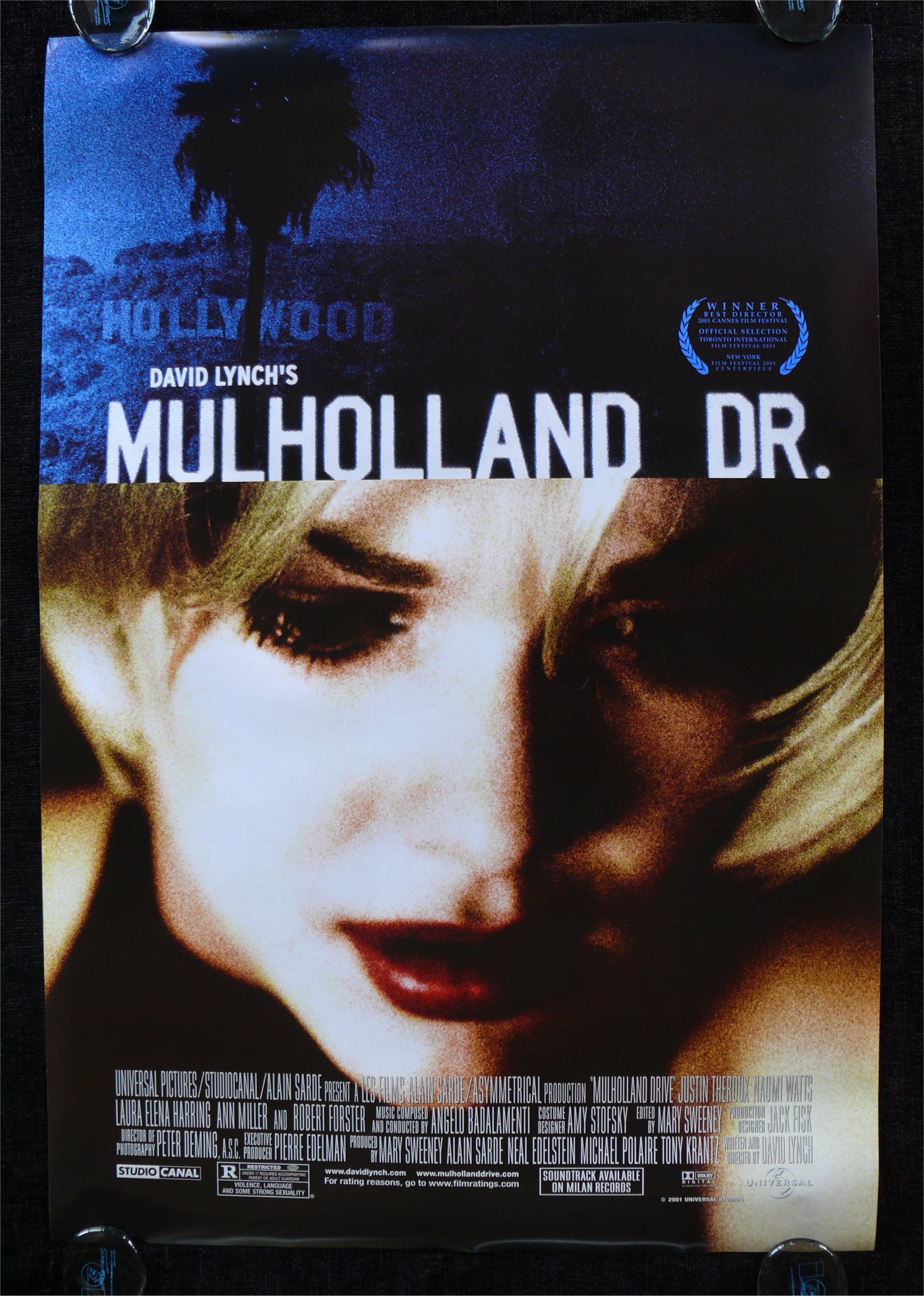

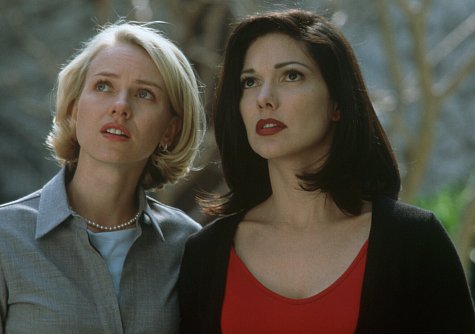 When Betty Elms (Naomi Watts) disembarks a plane at LAX she is a perky Canadian come to Hollywood to become a movie star. She makes her way to her aunt's apartment where she finds the mysterious brunette in the shower. "Rita" (Laura Harring) has a bundle of cash in her purse and no recollection of how it got there or who she is.
When Betty Elms (Naomi Watts) disembarks a plane at LAX she is a perky Canadian come to Hollywood to become a movie star. She makes her way to her aunt's apartment where she finds the mysterious brunette in the shower. "Rita" (Laura Harring) has a bundle of cash in her purse and no recollection of how it got there or who she is. Lesbian sex is declared in the Bible as a sin. Paul, in his letter to the Romans, says: "Because of this, God gave them over to shameful lusts. Even their women exchanged natural relations for unnatural ones." (Rom. 1:26). They had stopped worshiping him, their creator, and exchanged the truth of God for a lie. The sex scene is quite troubling. Yet, Jeffrey Overstreet in his very
Lesbian sex is declared in the Bible as a sin. Paul, in his letter to the Romans, says: "Because of this, God gave them over to shameful lusts. Even their women exchanged natural relations for unnatural ones." (Rom. 1:26). They had stopped worshiping him, their creator, and exchanged the truth of God for a lie. The sex scene is quite troubling. Yet, Jeffrey Overstreet in his very 

 Piaf's early years were hard. The movie picks up when she is five, with Manon Chevallier playing young Edith. Her father is a soldier in battle and her mother is an alcoholic street singer who has little time to care for a small child. Eventually her father came home from the war, but as a circus contortionist he was no great help, and so he carted her off to his mother, a madam running a brothel. It was there that she first felt love, from the prostitutes. In particular, Titine (Emmanuelle Seigner, from
Piaf's early years were hard. The movie picks up when she is five, with Manon Chevallier playing young Edith. Her father is a soldier in battle and her mother is an alcoholic street singer who has little time to care for a small child. Eventually her father came home from the war, but as a circus contortionist he was no great help, and so he carted her off to his mother, a madam running a brothel. It was there that she first felt love, from the prostitutes. In particular, Titine (Emmanuelle Seigner, from  With no real family and no real home, Edith "graduates" to street singing on her own, just like her mother, but with a friend Mômone (Sylive Testud) who stood by her. Mômone would go on to be a life-long friend and companion. It is on one of these street corner performances that she is discovered by the music club owner.
With no real family and no real home, Edith "graduates" to street singing on her own, just like her mother, but with a friend Mômone (Sylive Testud) who stood by her. Mômone would go on to be a life-long friend and companion. It is on one of these street corner performances that she is discovered by the music club owner. Throughout the film Edith Piaf's rise to stardom is accompanied by pain and loneliness. Early on, her association with the French mob causes a key friend to be murdered and her to be placed under suspicion. Later, a car crash puts her in hospital and leads to her addiction to painkilling drugs. Yet, despite these setbacks her life was her singing. Perhaps her greatest tragedy was her ill-fated love of married champion boxer Marcel Cerdan (Jean-Pierre Martins).
Throughout the film Edith Piaf's rise to stardom is accompanied by pain and loneliness. Early on, her association with the French mob causes a key friend to be murdered and her to be placed under suspicion. Later, a car crash puts her in hospital and leads to her addiction to painkilling drugs. Yet, despite these setbacks her life was her singing. Perhaps her greatest tragedy was her ill-fated love of married champion boxer Marcel Cerdan (Jean-Pierre Martins).

 (Angelina Jolie) appears one day alongside him at his pharmacy the boredom of his life's routine is irrevocably shattered. She rescues him from an attack by Cross, a shadowy assassin. But Cross steals a truck and they embark on a gripping car chase, one to rival the best in recent cinema. Indeed,
(Angelina Jolie) appears one day alongside him at his pharmacy the boredom of his life's routine is irrevocably shattered. She rescues him from an attack by Cross, a shadowy assassin. But Cross steals a truck and they embark on a gripping car chase, one to rival the best in recent cinema. Indeed,  And control is one of the issues of this movie. Sloan's first pep-talk to Gibson tells him, "It's a choice, Wesley, that each of us must face: to remain ordinary, pathetic, beat-down, coasting through a miserable existence, like sheep herded by fate - or you can take control of your own destiny and join us." Gibson chooses to take back control of his life. We all want to control our lives, although control might be a myth. What control do we really have? How much of our lives is beyond our control? We do have a circle of control and influence but the rest is outside of this circle, with others acting on us.
And control is one of the issues of this movie. Sloan's first pep-talk to Gibson tells him, "It's a choice, Wesley, that each of us must face: to remain ordinary, pathetic, beat-down, coasting through a miserable existence, like sheep herded by fate - or you can take control of your own destiny and join us." Gibson chooses to take back control of his life. We all want to control our lives, although control might be a myth. What control do we really have? How much of our lives is beyond our control? We do have a circle of control and influence but the rest is outside of this circle, with others acting on us.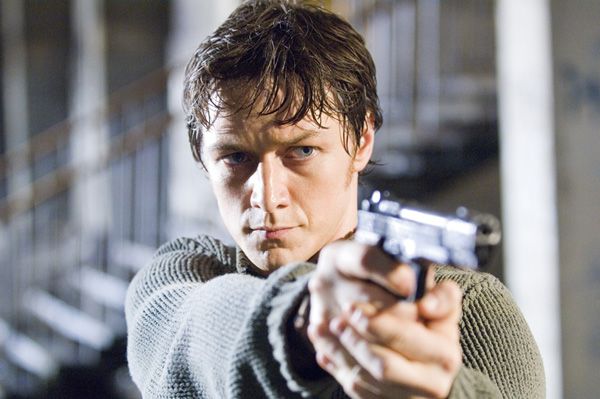 As much as Wanted is a high-octane thrill ride, it is full of one-dimensional caricatures of people, whose names are nothing more than descriptors: Fox, The Repairman, The Exterminator, Mr. X. And the plot has holes so large you would need a giant loom to darn them. How do Fox and Gibson evade the law though they are "Wanted" and their photos are on the front of all the newspapers? Why did the bullets that took the wings off the flies not ricochet back to cause harm? How did Gibson fall thousands of feet and still survive? How did Gibson get back to the States after his fall? How did the mysterious loom survive for thousands of years? Indeed, how did it come to America, a country only centuries not millennia old?
As much as Wanted is a high-octane thrill ride, it is full of one-dimensional caricatures of people, whose names are nothing more than descriptors: Fox, The Repairman, The Exterminator, Mr. X. And the plot has holes so large you would need a giant loom to darn them. How do Fox and Gibson evade the law though they are "Wanted" and their photos are on the front of all the newspapers? Why did the bullets that took the wings off the flies not ricochet back to cause harm? How did Gibson fall thousands of feet and still survive? How did Gibson get back to the States after his fall? How did the mysterious loom survive for thousands of years? Indeed, how did it come to America, a country only centuries not millennia old?

 When she gets the look-alike doll things get mysterious. Because she is bored and not allowed to go out and play in the Oregon mud, she is assigned the job of counting the windows and doors in the house. In so doing she finds one small door wall-papered over and locked. When she persuades her mom (Teri Hatcher) to open this door, there is nothing behind it but a brick wall. But that night she is drawn to this door and discovers it is a portal to a parallel reality.
When she gets the look-alike doll things get mysterious. Because she is bored and not allowed to go out and play in the Oregon mud, she is assigned the job of counting the windows and doors in the house. In so doing she finds one small door wall-papered over and locked. When she persuades her mom (Teri Hatcher) to open this door, there is nothing behind it but a brick wall. But that night she is drawn to this door and discovers it is a portal to a parallel reality. Going through the corridor she emerges in the "same" room, but things are not quite the same. This alternate pink house is beautful and decorated, not dingy and dull. Her "other parents" are attentive and devoted to her. Instead of her real dad cooking slop, her "other mother" (also Teri Hatcher) cooks feasts to please her. And, unlike her real father, her other father (John Hodgman) is a superb gardener. The only odd thing is that their eyes are buttons.
Going through the corridor she emerges in the "same" room, but things are not quite the same. This alternate pink house is beautful and decorated, not dingy and dull. Her "other parents" are attentive and devoted to her. Instead of her real dad cooking slop, her "other mother" (also Teri Hatcher) cooks feasts to please her. And, unlike her real father, her other father (John Hodgman) is a superb gardener. The only odd thing is that their eyes are buttons.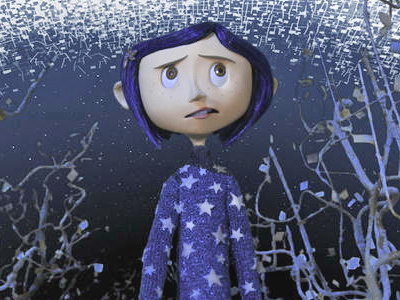 There are some stunning "set-pieces," including a scene where the other father causes a magnificent garden to emerge instantaneously and another where the two alternate spinsters perform in front of a theater full of terriers. My personal favorite is where the other world literally unravels before Coraline's eyes. As in an action thriller, she has to keep a step ahead of this unravelling to stay alive.
There are some stunning "set-pieces," including a scene where the other father causes a magnificent garden to emerge instantaneously and another where the two alternate spinsters perform in front of a theater full of terriers. My personal favorite is where the other world literally unravels before Coraline's eyes. As in an action thriller, she has to keep a step ahead of this unravelling to stay alive. Finally, an ethical warning emerges from Coraline. Just as the "other mother" looked so caring and loving but turned out to be creepy and evil, so there are those in our real world who are not what they seem. Jesus told his disciples to beware of wolves in sheep's clothing (Matt. 7:15). There are people who will pretend to be what they are not simply to use us, to deceive us, to destroy us. We may not recognize them instantly, but if we are on the alert, we will know them by their fruit (Matt. 7:16). As Coraline came to see what her other mother was by the fruit of her desires, so we can see those who do not have our interests at heart by their fruit. How is your ability to judge fruit?
Finally, an ethical warning emerges from Coraline. Just as the "other mother" looked so caring and loving but turned out to be creepy and evil, so there are those in our real world who are not what they seem. Jesus told his disciples to beware of wolves in sheep's clothing (Matt. 7:15). There are people who will pretend to be what they are not simply to use us, to deceive us, to destroy us. We may not recognize them instantly, but if we are on the alert, we will know them by their fruit (Matt. 7:16). As Coraline came to see what her other mother was by the fruit of her desires, so we can see those who do not have our interests at heart by their fruit. How is your ability to judge fruit?